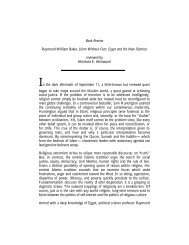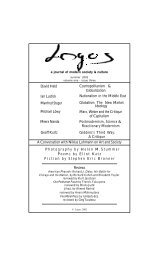Michael J. Thompson Stephen Eric Bronner Wadood Hamad - Logos
Michael J. Thompson Stephen Eric Bronner Wadood Hamad - Logos
Michael J. Thompson Stephen Eric Bronner Wadood Hamad - Logos
You also want an ePaper? Increase the reach of your titles
YUMPU automatically turns print PDFs into web optimized ePapers that Google loves.
Robert J. Antonio<br />
calling for universal citizenship and state action to insure social and political<br />
rights and to secure social equality. By contrast, he explains, engaging a setting<br />
that lacked the ancien régime’s cultural and political unity, American framers<br />
forged a vision of a self-managed democracy that is composed of diverse<br />
communities and individuals and that secures inclusion through free<br />
association and minimal reliance on state power. He holds that adoption of<br />
judicial autonomy and competitive political parties made clear that rights had<br />
to be won and defended politically. Howard embraces American “republican<br />
democracy,” which he sees to be inherently pluralist, open, and dynamic, while<br />
he implies that the state-centered French “democratic republic” is prone to the<br />
sociological reduction and proto-totalitarian singularity that he says inheres in<br />
Marxism. Still, he argues that American democracy may also express<br />
antipolitical tendencies; e.g., its emphasis on individual rights can degenerate<br />
into a “procedural republic” manifesting “right over good,” legal formality, and<br />
social fragmentation. In his view, the republican idea in France as well as in the<br />
United States is “political” rather than “socio-economic” and, thus, can be<br />
employed critically against the sociological reduction and collective subjects<br />
(pp. 174, 184). Howard’s historical accounts of French and American<br />
republicanism are too complex to adequately summarize here. However, their<br />
unifying thread is emphatic critique of the reduction of discursively-mediated<br />
political action to general sociological contexts and fictive collective subjects,<br />
which he implies deprive politics of their historical particularity and complex,<br />
dynamic, plural, dispersed agency.<br />
Howard speaks briefly about a totalizing “politics of will” that posits—<br />
independent of political action—a “right thing to be done” and a “unified<br />
actor” to do it and about an opposed “politics of judgement” that reflects<br />
critically on the consequences of political action and acts prudently. Stressing<br />
the need to take “responsibility” for political decision, which the politics of<br />
will abjures, Howard suggests that the politics of judgement suffuse republican<br />
democracy and his own analyses (pp. 18-22, 30, 78, 74, 107, 194-96). He also<br />
mentions in passing Max Weber’s related “ethics of conviction” and “ethics of<br />
responsibility” (p. 236). These concepts were part of Weber’s broader posttraditional<br />
argument about political responsibility, which rejected ideas of<br />
historical necessity and collective subjects and the consequent aversion of<br />
political decision. Moreover, Weber warned that fanatical forms of conviction<br />
suspend ethical reflection as well as political prudence, justifying extreme<br />
<strong>Logos</strong> 2.3 – Summer 2003




